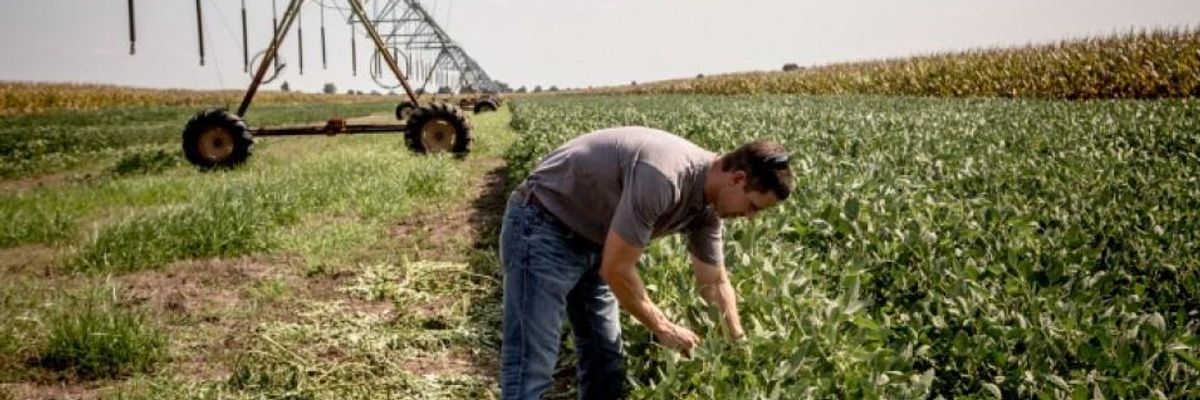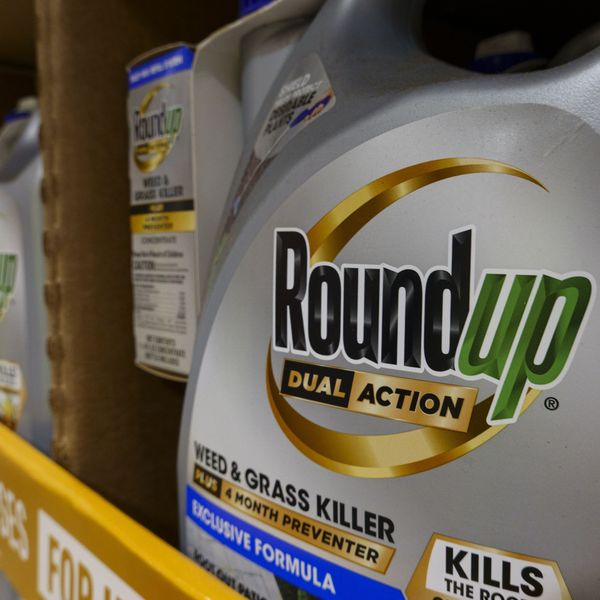
Brad Rose looks at rows of soybean plants that show signs of having been affected by dicamba use on August 9, 2017. He doesn't use it on his crops and he's assured by neighbors within a mile and a half that they haven't used it either. According to him, that means that the chemical had to travel about two miles to reach his crops. (Photo: The Washington Post)
Despite Court Ruling and Drift Concerns, EPA Approves Use of Dicamba Products on Soybeans and Cotton for Five Years
One critic charged that the agency "has shown such callous indifference to the damage dicamba has caused to farmers and wildlife alike."
Public health advocates and environmentalists on Tuesday sharply condemned the Environmental Protection Agency's approval of three dicamba products despite farmers' concerns about drift damage and a recent federal court ruling that found the EPA previously "substantially understated risks that it acknowledged and failed entirely to acknowledge other risks" related to the herbicide.
"It is clear that this decision is about protecting the market share of chemical companies and their corresponding genetically enhanced seed stock rather than providing farmers with choices for the tools they use to grow their crops."
--Rob Faux, PANEPA Administrator Andrew Wheeler announced at a Georgia farm that the agency had approved new five-year registrations for two "over-the-top" dicamba products--XtendiMax with VaporGrip Technology from Bayer (formerly Monsanto) and Engenia Herbicide from BASF--and extended until 2025 the registration of Syngenta's Tavium Plus VaporGrip Technology.
All three registrations are for use on dicamba-tolerant cotton and soybeans.
As Common Dreams reported in June, the U.S. Court of Appeals for the 9th Circuit overturned the EPA's 2018 approval of XtendiMax, Engenia, and Corteva's FeXapan. Days after that decision, the agency issued a guidance allowing for continued use of the products through July.
The advocacy groups behind that case--the Center for Food Safety, Center for Biological Diversity, National Family Farm Coalition, and Pesticide Action Network (PAN) North America--tried unsuccessfully to secure a court order halting the continued use of the products this summer. They responded with alarm to Wheeler's Tuesday announcement and vowed to fight back.
"Rather than evaluating the significant costs of dicamba drift as the 9th Circuit told them the law required, EPA rushed re-approval as a political prop just before the election, sentencing farmers and the environment to another five years of unacceptable damage," declared Center for Food Safety legal director George Kimbrell. "We will most certainly challenge these unlawful approvals."
\u201cThis is yet another key decision that Trump administration is getting out the door before the end of this term. Lots of lawsuits over the use of this weedkiller. So topic is not over.\u201d— Eric Lipton (@Eric Lipton) 1603837352
"It is clear that this decision is about protecting the market share of chemical companies and their corresponding genetically enhanced seed stock rather than providing farmers with choices for the tools they use to grow their crops," PAN communications associate Rob Faux said in a statement. "Farmers who might want to select a different seed product and those who might want to pursue alternative crops or alternative cropping systems are simply left to wonder how much damage they must expect in the coming months to their fields."
Faux, who is also an Iowa farmer, explained:
As early as 2018, leading schools of agriculture were recommending that dicamba technologies be applied as a pre-emergent application rather than an over-the-top spray and the Bader Farms lawsuit revealed that Monsanto was fully aware that the product would cause problems even before they applied for dicamba's first provisional registration.
The past growing season simply provided more evidence that dicamba products (BASF's Engenia, Bayer/Monsanto's ExtendiMax, and Corteva's FeXipan) [are] not suitable for over-the-top application, especially during warmer months, when these products are prone to volatilization, resulting in drift damage as many as four days after application. The state of Iowa reported a record number of dicamba-related drift complaints and weed scientists noted that damage was worse than prior years, showing plant injury on a 'landscape level' throughout the state.
"To manage off-site movement of dicamba, EPA's 2020 registration features important control measures," according to the agency. They include:
- Requiring an approved pH-buffering agent (also called a Volatility Reduction Agent or VRA) be tank mixed with OTT dicamba products prior to all applications to control volatility;
- Requiring a downwind buffer of 240 feet and 310 feet in areas where listed species are located;
- Prohibiting OTT application of dicamba on soybeans after June 30 and cotton after July 30; and
- Simplifying the label and use directions so that growers can more easily determine when and how to properly apply dicamba.
However, "given EPA-approved versions of dicamba have already damaged millions of U.S. acres of crops and natural areas, there's no reason to trust that the agency got it right this time," Nathan Donley, senior scientist at the Center for Biological Diversity, said Tuesday. "As the judges who tossed out the EPA's previous approval stated, the agency wrongly dismissed many of dicamba's proven harms."
"At this point," Donley added, "the EPA has shown such callous indifference to the damage dicamba has caused to farmers and wildlife alike, and has been so desperate to appease the pesticide industry, it has zero credibility when it comes to pesticide safety."
In a statement Wednesday, Ken Cook, president of the nonprofit Environmental Working Group, also put the new registrations into the broader context of the current administration's pesticide agenda.
"Protecting the pesticide industry has been a top priority of the EPA during the Trump administration," Cook said. "Millions of acres of crops will continue to be damaged, and the health of farmworkers, children, and all those who live near farms where dicamba is used will be at risk--all in the name of appeasing chemical agriculture."
This post has been updated with comment from the Environmental Working Group.
An Urgent Message From Our Co-Founder
Dear Common Dreams reader, The U.S. is on a fast track to authoritarianism like nothing I've ever seen. Meanwhile, corporate news outlets are utterly capitulating to Trump, twisting their coverage to avoid drawing his ire while lining up to stuff cash in his pockets. That's why I believe that Common Dreams is doing the best and most consequential reporting that we've ever done. Our small but mighty team is a progressive reporting powerhouse, covering the news every day that the corporate media never will. Our mission has always been simple: To inform. To inspire. And to ignite change for the common good. Now here's the key piece that I want all our readers to understand: None of this would be possible without your financial support. That's not just some fundraising cliche. It's the absolute and literal truth. We don't accept corporate advertising and never will. We don't have a paywall because we don't think people should be blocked from critical news based on their ability to pay. Everything we do is funded by the donations of readers like you. Will you donate now to help power the nonprofit, independent reporting of Common Dreams? Thank you for being a vital member of our community. Together, we can keep independent journalism alive when it’s needed most. - Craig Brown, Co-founder |
Public health advocates and environmentalists on Tuesday sharply condemned the Environmental Protection Agency's approval of three dicamba products despite farmers' concerns about drift damage and a recent federal court ruling that found the EPA previously "substantially understated risks that it acknowledged and failed entirely to acknowledge other risks" related to the herbicide.
"It is clear that this decision is about protecting the market share of chemical companies and their corresponding genetically enhanced seed stock rather than providing farmers with choices for the tools they use to grow their crops."
--Rob Faux, PANEPA Administrator Andrew Wheeler announced at a Georgia farm that the agency had approved new five-year registrations for two "over-the-top" dicamba products--XtendiMax with VaporGrip Technology from Bayer (formerly Monsanto) and Engenia Herbicide from BASF--and extended until 2025 the registration of Syngenta's Tavium Plus VaporGrip Technology.
All three registrations are for use on dicamba-tolerant cotton and soybeans.
As Common Dreams reported in June, the U.S. Court of Appeals for the 9th Circuit overturned the EPA's 2018 approval of XtendiMax, Engenia, and Corteva's FeXapan. Days after that decision, the agency issued a guidance allowing for continued use of the products through July.
The advocacy groups behind that case--the Center for Food Safety, Center for Biological Diversity, National Family Farm Coalition, and Pesticide Action Network (PAN) North America--tried unsuccessfully to secure a court order halting the continued use of the products this summer. They responded with alarm to Wheeler's Tuesday announcement and vowed to fight back.
"Rather than evaluating the significant costs of dicamba drift as the 9th Circuit told them the law required, EPA rushed re-approval as a political prop just before the election, sentencing farmers and the environment to another five years of unacceptable damage," declared Center for Food Safety legal director George Kimbrell. "We will most certainly challenge these unlawful approvals."
\u201cThis is yet another key decision that Trump administration is getting out the door before the end of this term. Lots of lawsuits over the use of this weedkiller. So topic is not over.\u201d— Eric Lipton (@Eric Lipton) 1603837352
"It is clear that this decision is about protecting the market share of chemical companies and their corresponding genetically enhanced seed stock rather than providing farmers with choices for the tools they use to grow their crops," PAN communications associate Rob Faux said in a statement. "Farmers who might want to select a different seed product and those who might want to pursue alternative crops or alternative cropping systems are simply left to wonder how much damage they must expect in the coming months to their fields."
Faux, who is also an Iowa farmer, explained:
As early as 2018, leading schools of agriculture were recommending that dicamba technologies be applied as a pre-emergent application rather than an over-the-top spray and the Bader Farms lawsuit revealed that Monsanto was fully aware that the product would cause problems even before they applied for dicamba's first provisional registration.
The past growing season simply provided more evidence that dicamba products (BASF's Engenia, Bayer/Monsanto's ExtendiMax, and Corteva's FeXipan) [are] not suitable for over-the-top application, especially during warmer months, when these products are prone to volatilization, resulting in drift damage as many as four days after application. The state of Iowa reported a record number of dicamba-related drift complaints and weed scientists noted that damage was worse than prior years, showing plant injury on a 'landscape level' throughout the state.
"To manage off-site movement of dicamba, EPA's 2020 registration features important control measures," according to the agency. They include:
- Requiring an approved pH-buffering agent (also called a Volatility Reduction Agent or VRA) be tank mixed with OTT dicamba products prior to all applications to control volatility;
- Requiring a downwind buffer of 240 feet and 310 feet in areas where listed species are located;
- Prohibiting OTT application of dicamba on soybeans after June 30 and cotton after July 30; and
- Simplifying the label and use directions so that growers can more easily determine when and how to properly apply dicamba.
However, "given EPA-approved versions of dicamba have already damaged millions of U.S. acres of crops and natural areas, there's no reason to trust that the agency got it right this time," Nathan Donley, senior scientist at the Center for Biological Diversity, said Tuesday. "As the judges who tossed out the EPA's previous approval stated, the agency wrongly dismissed many of dicamba's proven harms."
"At this point," Donley added, "the EPA has shown such callous indifference to the damage dicamba has caused to farmers and wildlife alike, and has been so desperate to appease the pesticide industry, it has zero credibility when it comes to pesticide safety."
In a statement Wednesday, Ken Cook, president of the nonprofit Environmental Working Group, also put the new registrations into the broader context of the current administration's pesticide agenda.
"Protecting the pesticide industry has been a top priority of the EPA during the Trump administration," Cook said. "Millions of acres of crops will continue to be damaged, and the health of farmworkers, children, and all those who live near farms where dicamba is used will be at risk--all in the name of appeasing chemical agriculture."
This post has been updated with comment from the Environmental Working Group.
Public health advocates and environmentalists on Tuesday sharply condemned the Environmental Protection Agency's approval of three dicamba products despite farmers' concerns about drift damage and a recent federal court ruling that found the EPA previously "substantially understated risks that it acknowledged and failed entirely to acknowledge other risks" related to the herbicide.
"It is clear that this decision is about protecting the market share of chemical companies and their corresponding genetically enhanced seed stock rather than providing farmers with choices for the tools they use to grow their crops."
--Rob Faux, PANEPA Administrator Andrew Wheeler announced at a Georgia farm that the agency had approved new five-year registrations for two "over-the-top" dicamba products--XtendiMax with VaporGrip Technology from Bayer (formerly Monsanto) and Engenia Herbicide from BASF--and extended until 2025 the registration of Syngenta's Tavium Plus VaporGrip Technology.
All three registrations are for use on dicamba-tolerant cotton and soybeans.
As Common Dreams reported in June, the U.S. Court of Appeals for the 9th Circuit overturned the EPA's 2018 approval of XtendiMax, Engenia, and Corteva's FeXapan. Days after that decision, the agency issued a guidance allowing for continued use of the products through July.
The advocacy groups behind that case--the Center for Food Safety, Center for Biological Diversity, National Family Farm Coalition, and Pesticide Action Network (PAN) North America--tried unsuccessfully to secure a court order halting the continued use of the products this summer. They responded with alarm to Wheeler's Tuesday announcement and vowed to fight back.
"Rather than evaluating the significant costs of dicamba drift as the 9th Circuit told them the law required, EPA rushed re-approval as a political prop just before the election, sentencing farmers and the environment to another five years of unacceptable damage," declared Center for Food Safety legal director George Kimbrell. "We will most certainly challenge these unlawful approvals."
\u201cThis is yet another key decision that Trump administration is getting out the door before the end of this term. Lots of lawsuits over the use of this weedkiller. So topic is not over.\u201d— Eric Lipton (@Eric Lipton) 1603837352
"It is clear that this decision is about protecting the market share of chemical companies and their corresponding genetically enhanced seed stock rather than providing farmers with choices for the tools they use to grow their crops," PAN communications associate Rob Faux said in a statement. "Farmers who might want to select a different seed product and those who might want to pursue alternative crops or alternative cropping systems are simply left to wonder how much damage they must expect in the coming months to their fields."
Faux, who is also an Iowa farmer, explained:
As early as 2018, leading schools of agriculture were recommending that dicamba technologies be applied as a pre-emergent application rather than an over-the-top spray and the Bader Farms lawsuit revealed that Monsanto was fully aware that the product would cause problems even before they applied for dicamba's first provisional registration.
The past growing season simply provided more evidence that dicamba products (BASF's Engenia, Bayer/Monsanto's ExtendiMax, and Corteva's FeXipan) [are] not suitable for over-the-top application, especially during warmer months, when these products are prone to volatilization, resulting in drift damage as many as four days after application. The state of Iowa reported a record number of dicamba-related drift complaints and weed scientists noted that damage was worse than prior years, showing plant injury on a 'landscape level' throughout the state.
"To manage off-site movement of dicamba, EPA's 2020 registration features important control measures," according to the agency. They include:
- Requiring an approved pH-buffering agent (also called a Volatility Reduction Agent or VRA) be tank mixed with OTT dicamba products prior to all applications to control volatility;
- Requiring a downwind buffer of 240 feet and 310 feet in areas where listed species are located;
- Prohibiting OTT application of dicamba on soybeans after June 30 and cotton after July 30; and
- Simplifying the label and use directions so that growers can more easily determine when and how to properly apply dicamba.
However, "given EPA-approved versions of dicamba have already damaged millions of U.S. acres of crops and natural areas, there's no reason to trust that the agency got it right this time," Nathan Donley, senior scientist at the Center for Biological Diversity, said Tuesday. "As the judges who tossed out the EPA's previous approval stated, the agency wrongly dismissed many of dicamba's proven harms."
"At this point," Donley added, "the EPA has shown such callous indifference to the damage dicamba has caused to farmers and wildlife alike, and has been so desperate to appease the pesticide industry, it has zero credibility when it comes to pesticide safety."
In a statement Wednesday, Ken Cook, president of the nonprofit Environmental Working Group, also put the new registrations into the broader context of the current administration's pesticide agenda.
"Protecting the pesticide industry has been a top priority of the EPA during the Trump administration," Cook said. "Millions of acres of crops will continue to be damaged, and the health of farmworkers, children, and all those who live near farms where dicamba is used will be at risk--all in the name of appeasing chemical agriculture."
This post has been updated with comment from the Environmental Working Group.

